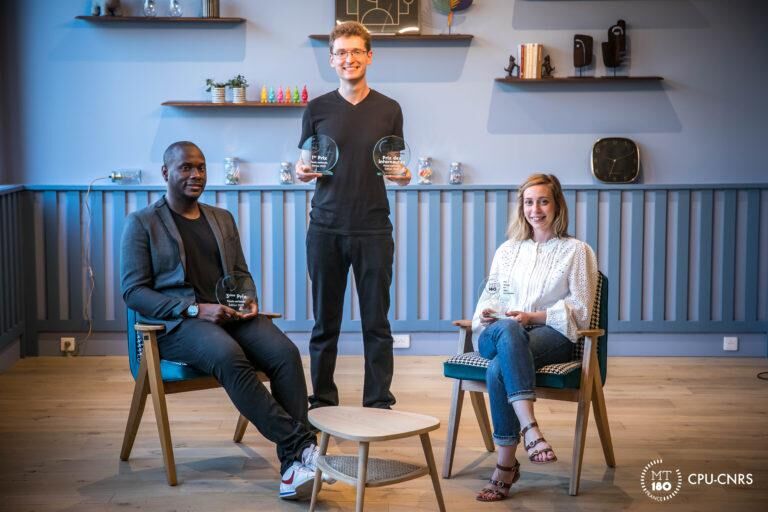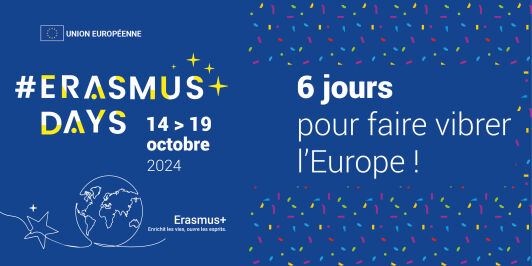 Notícias
Notícias 
National final of “Ma thèse en 180 secondes”: an alumni among the winners
The contest “Ma thèse en 180 secondes” is organised by the CNRS and the French Conférence des Présidents d’Université. It was held on June 10. A Gabonese alumni, former scholarship recipient of the ANBG programme, won the third Prize of the Jury.
The contest “Ma thèse en 180 secondes” (My thesis in 180 seconds) is organised by the CNRS and the French Conference of University Presidents (CPU, Conference of University Presidents). It was held on June 10. The four winners of the 2021 edition are now known, and they include a doctoral student who will represent France at the International final that will be held in Paris on September 30. Among the finalist winners, a Gabonese alumni, former scholarship recipient of the ANBG programme, won the third Prize of the Jury.
“Ma thèse en 180 secondes” (My thesis in 180 seconds) is an annual contest of scientific popularisation, open to all doctoral students in France 2014. The contest also serves as a showcase for their research topic, which they present in French and in simple terms, to a general public audience. Along several steps (regional, national, international competition), over 600 doctoral students from all regions of France were able to present their research project on stage, in three minutes and in a simple and fun way.
National winners
At the end of the regional finals, only 16 doctoral students reached the grand national final of “Ma thèse en 180 secondes”. At the end of their presentation, the jury and Internet users made their decision. The winners were honoured by the Minister for Higher Education, the CEO of the CNRS and the President of the CPU. The national jury awarded prizes to:
- Paul Dequidt from the Confederal University of Leonardo da Vinci in Poitiers, who won the First Prize of the jury. The doctoral student studied at the XLIM laboratory (University of Poitiers - CNRS - University of Limoges), and presented a thesis on “The analysis of multimodal NMR data by artificial intelligence for binary discrimination of glioma grade”. He will represent France at the international final;
- Louise Fliedel from the Sorbonne Paris Cité Alliance was awarded the Second Prize of the jury. She is a doctoral student from the Chemical and Biological Technologies for Health Unit (University of Paris - CNRS - Inserm), and presented her thesis entitled “Design, characterisation of nano-vectors and evaluation of their interaction with the placental barrier”.
A national prize for an international alumni
In addition to these two prizes, a Third Prize of the jury, was awarded to Peter Stephen Assaghle from the University of Aix-Marseille Provence Méditerranée.
This doctoral student from Gabon, who came to France for his higher education, is a former grant holder of the ANBG programme (Agence Nationale des Bourses du Gabon, National Agency for Scholarships in Gabon) managed by Campus France. He is a doctoral student in law at the Centre of Study and Research on Disputes (University of Toulon) and was selected among 58 semi-finalists. His thesis work focused on a highly relevant subject, namely “women’s vulnerability and violence trends in the African Great Lakes area”, which granted him both the 1st Regional Prize and the 3rd National Prize, awarded from the hands of last year’s winner. Peter Stephen Assaghle said at the end of his very moving performance:
It is always a pleasure to talk about my subject. It is urgent to talk about it, and the more we talk about it the better. MT180 allows us to get out of our laboratories, to popularise our work... and that is the most important thing for me.
A fourth distinction, the Internet Users’ Prize, was also granted to a doctoral student. His name is Paul Dequidt, a doctoral student at the Confederal University of Leonardo da Vinci in the XLIM laboratory (University of Poitiers - CNRS - University of Limoges) for his thesis on “Analysis of multimodal NMR data by artificial intelligence for the binary discrimination of glioma grade”.
Know more:
Photo credit: MT180 CPU-CNRS – David Pell





Comentários
Você precisa estar logado para deixar um comentário. Connectez-vous.